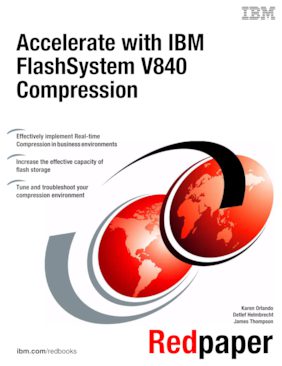Abstract
This IBM® Redpaper™ publication describes how to effectively implement IBM FlashSystem™ V840 (V840) and IBM Real-time Compression™ (RtC) and capacity savings. It walks you through planning, setup, configuration, operations, and performance guidance to use FlashSystem V840 performance.
It covers the following topics:
- "Overview and introductory concepts" discusses introductory concepts of IBM Real-time Compression, FlashSystem V840, and business benefits gained from implementing compression.
- "Planning your environment" describes candidate data sets and workloads for compression, and general guidelines. Also included is a topic on installing and using the Comprestimator utility to estimate expected compression rate for FlashSystem V840.
- "Setup and configuration" walks you through the process of creating and mapping compressed volumes for host environments.
- "Operations and analysis" discusses the V840 software stack, performance monitoring, using synthetic workloads with RtC, V840 with RtC compared with disk, and a topic on analysis and verification.
- "Hints and tips" documents how to find information for installing, servicing, and health status check information for FlashSystem V840. Also provided are hints on benchmarking tools and troubleshooting.
This publication is intended for use by storage administrators, who are responsible for the performance and growth of the IT storage infrastructure, and anyone who wants to learn more about effectively implementing FlashSystem V840 and IBM Real-time Compression.
Table of Contents
Chapter 1. Overview and introductory concepts
Chapter 2. Planning your environment
Chapter 3. Setup and configuration
Chapter 4. Operations and analysis
Chapter 5. Hints and tips
